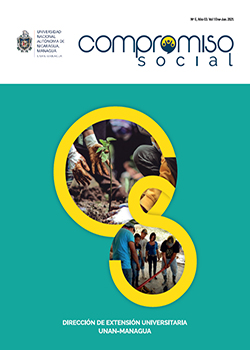Public Policies and situated training. Challenges of distancing
DOI:
https://doi.org/10.5377/recoso.v3i5.13022Keywords:
Education, pre-professional experiences, public policies, contextAbstract
This article is intended as a meeting, a conversation, between those of us who are writing and an invitation to those who read it to be part of the dialogue, who can question the words, accompanying these ideas with their own experiences. We try to generate a conversation from the plot that enables the dimensions of education, pre-professional and extension practices, contexts and public policies. We refer to pre-professional practices, those that students from all fields develop prior to graduation, although mainly focused on the social field and on the educational scenario of the health crisis due to pandemic. We use the experience that the year 2020 allowed to develop and from those experiences we reflect on the specific link of academic institutions - with their teachers, researchers, extension workers and students - in relation to specific effectors of public policies. This experience is based on an articulation with a specific area of the Provincial State of Córdoba, in Argentina, the Secretariat for Children, Adolescents and the Family. From this case analysis, of which we are part, we establish some links between the political aspect of education and the necessary dialogues of knowledge between universities and territories, in a plot that is intended to be reflective.
Downloads
References
Arendt, H. (1997). ¿Qué es política? Barcelona: Paidós.
Arendt, H. (2009). La condición humana. Buenos Aires: Paidos.
Chapato, M. E. (2016). El abordaje de la práctica de enseñanza situada: la captación de la complejidad. En R. UNICEN (Ed.), El abordaje de la práctica de enseñanza situada: la captación de la complejidad. (págs. 1-11). Tandil: UNICEN (Universidad Nacional del Centro de la provincia de Buenos Aires). Obtenido de http://www.ridaa.unicen.edu.ar/xmlui/handle/123456789/468
Freire, P. (2014). El grito manso. Buenos Aires: Siglo Veintiuno.
Frigerio, G., & Diker, G. (2003). Educación y alteridad. Las figuras del extranjero. Psicología y Educación, ensayos y experiencias, 48(48), 160-166.
Jara, O. (2018). La sistematización de experiencias: práctica y teoría para otros mundos posibles (1 ed.). Bogotá: CINDE.
Lahera, E. (10 de Agosto de 2004). Política y políticas públicas en los procesos de reforma en América Latina. “Similitudes y diversidades” (Proyecto FRA/02/073). (N. Unicas, Ed.CEPAL. Serie Políticas Sociales, 1-32. Obtenido de https://www.fundacionhenrydunant.org/images/stories/biblioteca/Politicas-Publicas/Pol%E2%94%9C%C2%A1tica%20y%20pol%E2%94%9C%C2%A1ticas%20p%E2%94%9C%E2%95%91blicas.pdf
Larrosa, J. (2018). Sobre la experiencia. (D. d. Primaria, Editor) Obtenido el 2021, de CEIP: http://www.ceip.edu.uy/documentos/2018/ifs/dapg/materiales/Jorge_Larrosa_Experiencia_y_alteridad.pdf
Downloads
Published
Issue
Section
License
Copyright (c) 2021 Universidad Nacional Autónoma de Nicaragua, Managua (UNAN-Managua)

This work is licensed under a Creative Commons Attribution-NonCommercial-ShareAlike 4.0 International License.




